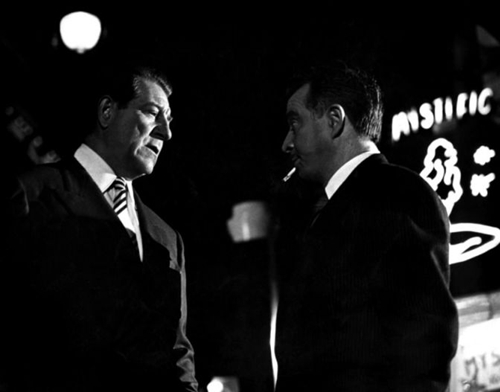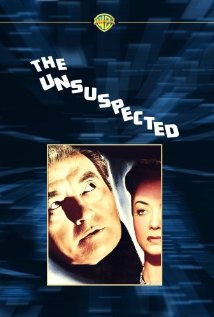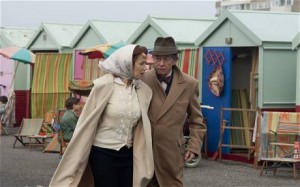By Michael Wilmington and Film Noir Blonde
The Noir File is FNB’s guide to classic film noir, neo-noir and pre-noir on cable TV. All movies below are from the schedule of Turner Classic Movies (TCM), which broadcasts them uncut and uninterrupted. The times are Eastern Standard and (Pacific Standard). Lots of Robert Mitchum and Gloria Grahame this week!
PICK OF THE WEEK
“Touchez pas au Grisbi” (1954, Jacques Becker). Friday, Nov. 30, 11:15 p.m. (8:15 p.m.): Film noir is a French term and the masters of the form include major French filmmakers as well as Americans. One of those masters is New Wave favorite Jacques Becker (“Casque d’Or“). And Becker’s noir masterpiece is “Touchez pas au Grisbi.” The film takes a wonderfully atmospheric and psychologically acute look at the Parisian underworld: at a legendary, stylish old gangster named Max le Menteur (played by the legendary, stylish Jean Gabin), at the spoils of Max’s last big job and at the unbreakable ties of friendship that entrap him. Adapted by Becker and Albert Simonin from Simonin’s novel, with two later noir mainstays in small roles: Jeanne Moreau and Lino Ventura. The title translates as “Don’t Touch the Loot.” (In French, with subtitles.)
Monday, Nov. 26
7 a.m. (4 a.m.): “The Narrow Margin” (1952, Richard Fleischer).
6:30 p.m. (3:30 p.m.): “The Steel Trap” (1952, Andrew L. Stone). In a neat twist from writer-director Stone, Joseph Cotten plays a bank employee/embezzler, desperately trying to return the loot he filched. With Teresa Wright. A favorite of noir expert Foster Hirsch.
6 p.m. (3 p.m.): “Brighton Rock” (1947, John Boulting). From Graham Greene’s classic novel about a babyfaced killer on Brighton beach named Pinkie (Richard Attenborough), smartly co-scripted by Greene.
2:30 a.m. (11:30 p.m.): “The Unsuspected” (1947, Michael Curtiz). Lesser-known but strong noir about a radio true crime show, whose producer (Claude Rains) becomes a murderer. With Joan Caulfield, Constance Bennett, Hurd Hatfield and Audrey Totter.
4:30 a.m. (1:30 a.m.): “The Woman on the Beach” (1947, Jean Renoir). Renoir’s U.S. noir: A disturbed guy (Bob Ryan) gets involved with a blind painter (Charles Bickford) and his sexy wife (Joan Bennett).
Wednesday, Nov. 28
7:15 a.m. (4:15 a.m.): “Crossfire” (1947, Edward Dmytryk). The famous postwar thriller about an anti-Semitic murder, co-starring Robert Mitchum, Robert Ryan, Robert Young and Gloria Grahame.
1:15 p.m. (10:15 a.m.): “Macao” (1952, Josef von Sternberg & Nicholas Ray). Robert Mitchum and Jane Russell strike sultry sparks in this exotic thriller from Howard Hughes’ RKO. Directed by Josef Von Sternberg, with uncredited reshooting by Nick Ray. Co-starring Gloria Grahame, William Bendix and Thomas Gomez.
2:45 p.m. (11:45 a.m.): “The Big Heat” (1953, Fritz Lang).
Friday, Nov. 30
12:30 p.m. (9:30 a.m.): “White Heat” (1949, Raoul Walsh).
8 p.m. (5 p.m.): “The Locket” (1946, John Brahm). Flashbacks within flashbacks adorn this stylish psychological noir about a troubled seductress (Laraine Day). With Robert Mitchum and Brian Aherne.













From FNB readers